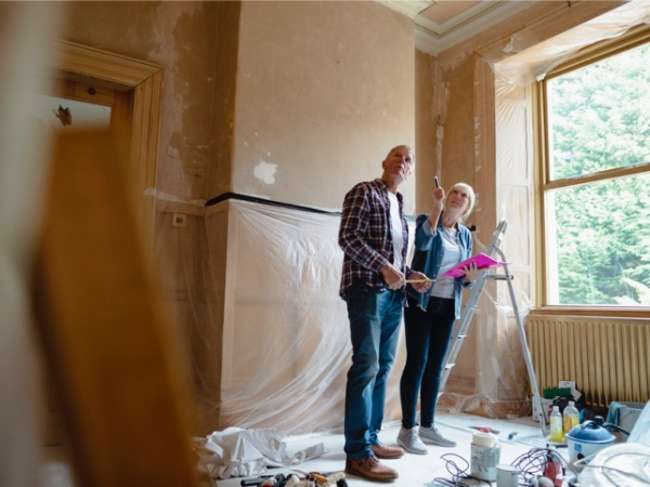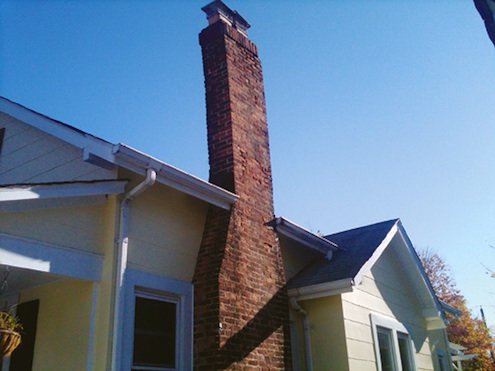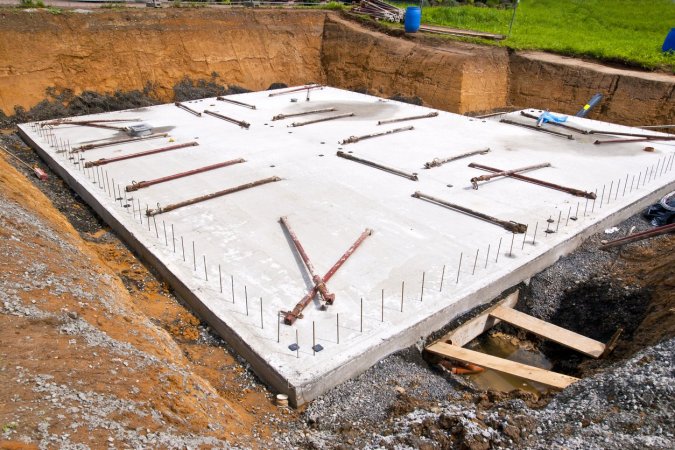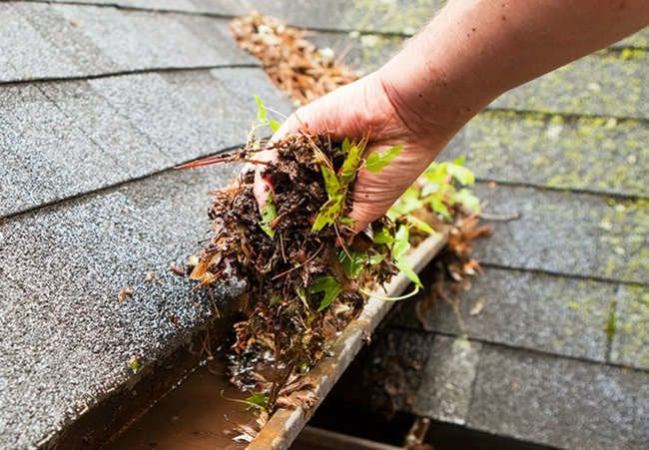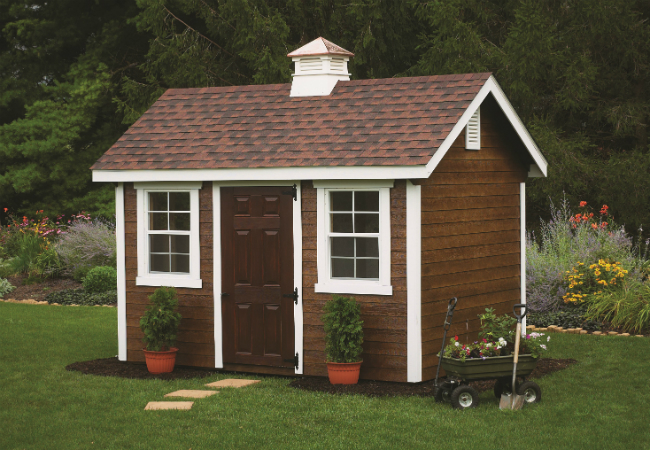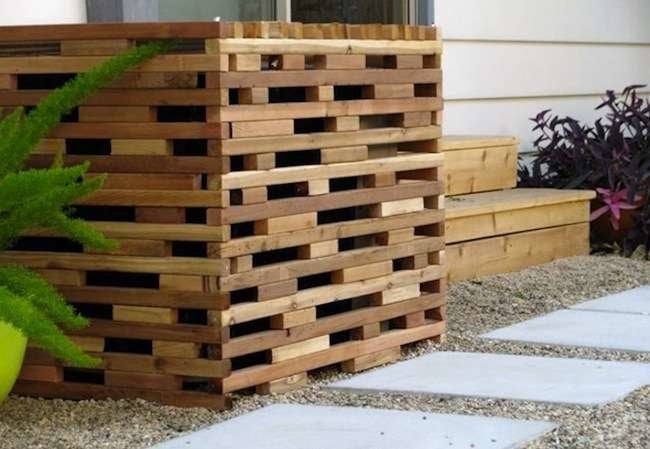We may earn revenue from the products available on this page and participate in affiliate programs. Learn More ›
Ready for Your Full-Home Renovation? Start by Reading This
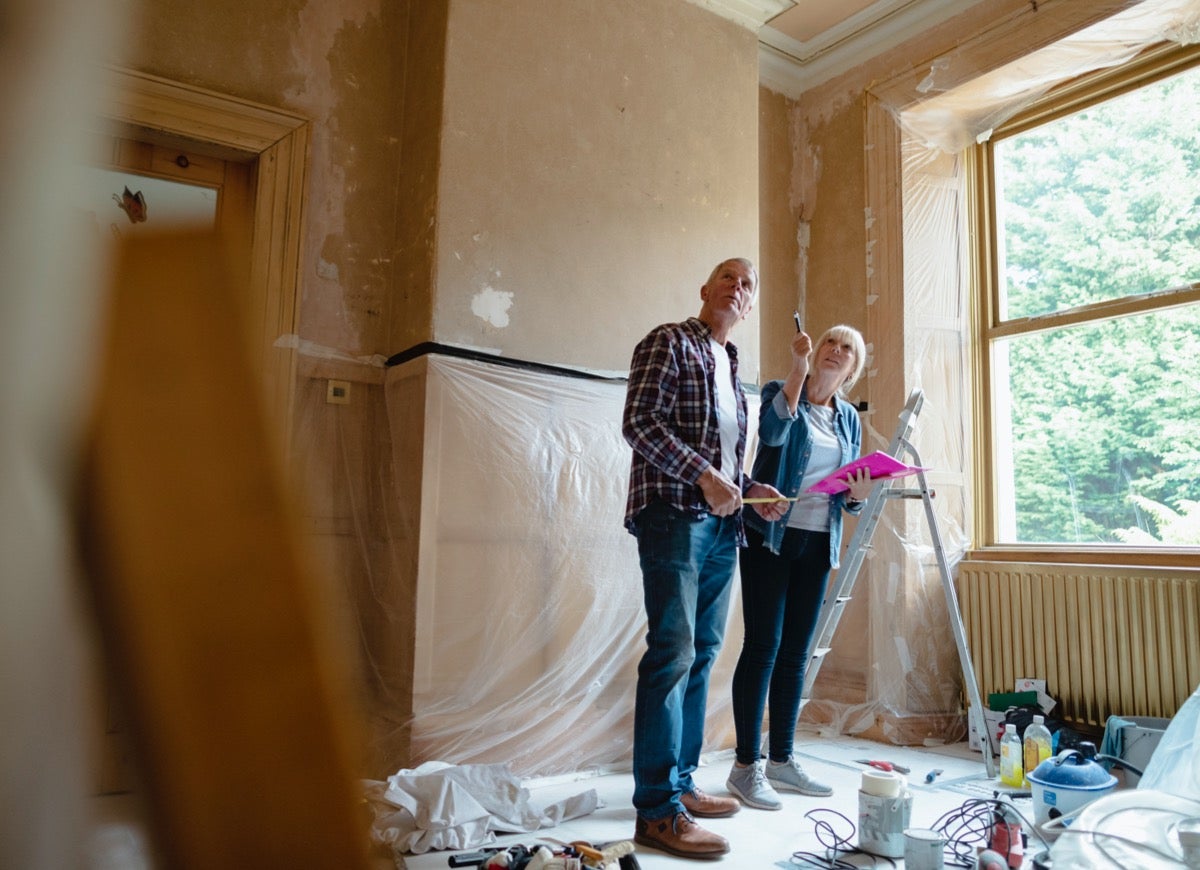
If you and your family have been working and learning from home during the Covid-19 pandemic, it’s easy to start feeling like your rooms and decor are a little … stale.
Maybe you’re sick of staring at that outdated kitchen backsplash, the chipping paint in your bathroom, or the faded wallpaper in your bedroom. Maybe you’re dreaming about finally doing that addition for a brand-new home office. Or maybe you’re ready to tear it all down and start over with the house of your dreams.
As someone who has spent most of the pandemic ripping her house down to the studs and renovating every single room, I can tell you that it’s possible. But if you’re planning to do a DIY full-home renovation, you’ll want to understand what you’re getting yourself into.
If you’re thinking about gutting your entire house, here are 11 important things to know before you take a sledgehammer to the walls.
You Can Do it Fast or Cheap, But Not Both

Any home renovation project is going to be time- and resource-intensive. Professional contractors can get the job done quickly, but their costs can also add up quickly. You can certainly save on labor costs by taking the DIY approach, but it will take a lot more time to complete each step—and you may have to teach yourself a few things along the way. Homeowners who don’t have unlimited time or an unlimited budget will need to find the right balance to keep their project going at a pace (and price) they’re comfortable with.
Related: 15 Hidden Costs of Home Remodeling
Budget for at Least 20 Percent More Than You Think You’ll Spend

Speaking of price, expect that every step of the process is going to cost more than anticipated. The cost of materials can change quickly based on supply and demand—for example, in mid-2020, lumber costs skyrocketed to double and triple their pre-pandemic rates. It’s also important to account for the cost of correcting any errors or fixing any breakages along the way (or if a contractor bails on you partway through the project and you need to pay another one to finish the job).
For homeowners who don’t have the liquid cash to finance a full renovation, securing a home improvement loan or tapping into a home equity line of credit are smart ways to cover the costs.
Figure Out Your Living and Storage Situation Before You Start Construction
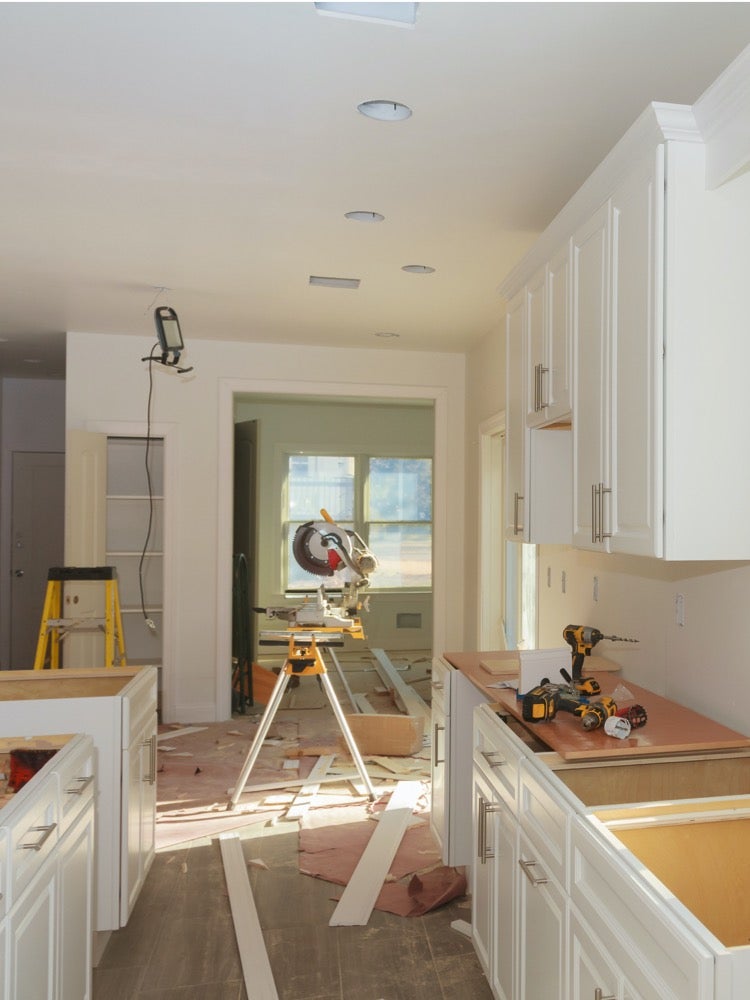
Are you going to gut and redo your house room by room and continue living there during the renovation, or are you planning to make temporary living arrangements during construction? Both options have their pros and cons, but it’s essential to figure out this piece of the puzzle before any plans get underway.
Homeowners who intend to live on-site should have a plan to minimize construction dust and debris, and be prepared to shuffle furniture and belongings around. Those who opt to move off-site should ensure that their arrangement is flexible enough to accommodate any delays in construction. The last thing anyone wants is to terminate a temporary lease, only to find out that their home won’t be move-in ready for another several weeks, or even months.
Building Codes Can Vary … a Lot

DIYers who have undertaken large home improvement projects know that every municipality has its own building codes. Even if you think you know the proper material to use for your bathroom pipes or how much space to allot between light fixtures, do your homework and speak with someone at your local building department to confirm.
If you’re hiring contractors to help, make sure they talk to the building department, too, especially if they haven’t done much work in your municipality before. Otherwise, homeowners might find themselves with a pile of failed inspections and rework to do.
Related: 8 Ways You Can Help Your Contractor Hit the Project Deadline
Know Your Strengths and Outsource the Rest

There are certain things the average handy homeowners can do themselves when gutting and renovating their house—knocking down walls, laying down interlocking floor panels, or installing cabinet hardware, for instance. However, unless the homeowner has a background in specialized trades like plumbing, electrical, HVAC, or roofing, it’s much better to leave those tasks to a professional.
Related: Decoding Shop Talk: Here’s What Your Contractor Is Actually Saying
Get the Right Tools for Any Job You’re DIYing

DIY enthusiasts may already have common job site tools like circular saws and nail guns in their workshop, but if you don’t, now is the time to research the tools you’ll need for any projects you’re planning to tackle yourself. For large power tools that are unlikely to be used after the renovation, such as jackhammers or posthole diggers, it may be more cost-effective to rent them from a local hardware supplier as needed rather than purchasing them outright.
Demolition is Fun (But Can Be Dangerous!)
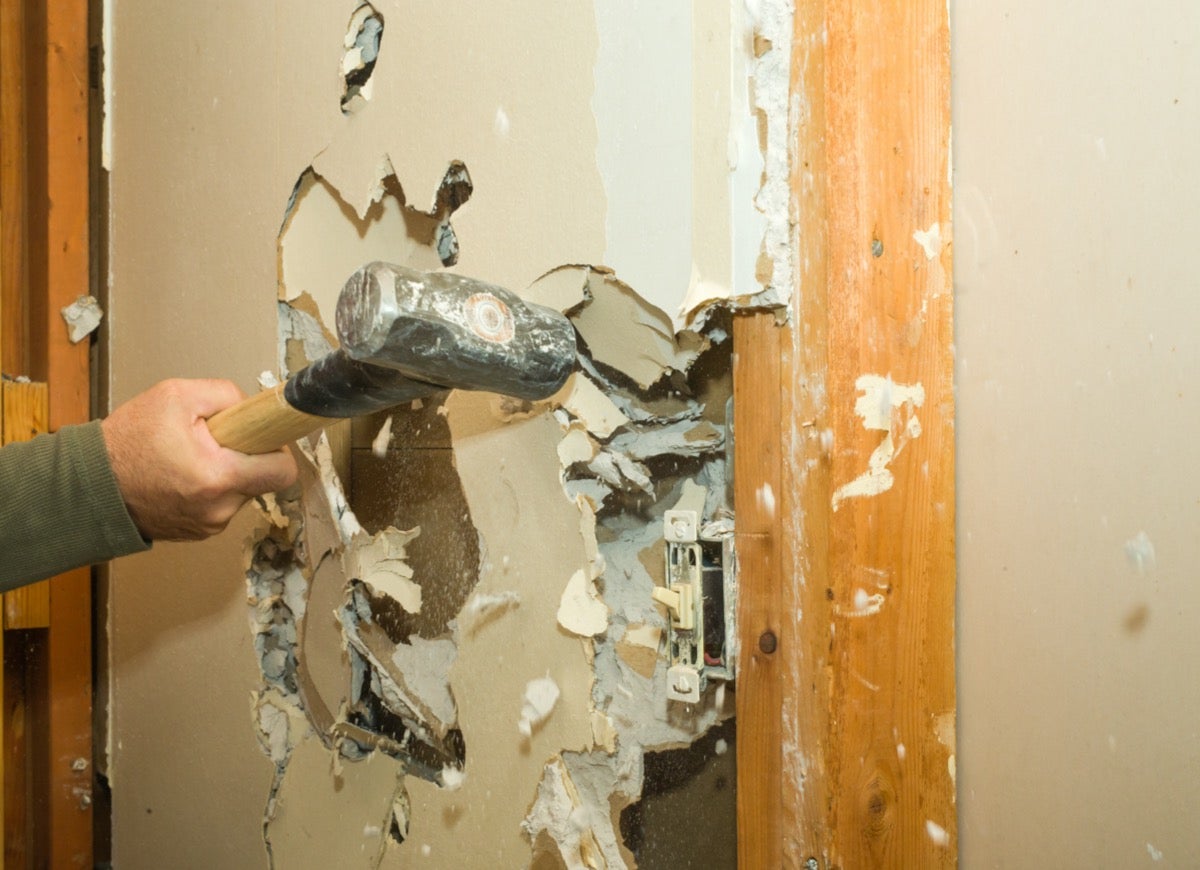
Looking for a healthy way to burn off some of that pent-up pandemic energy? There’s nothing quite like smashing walls and tearing down ceilings to let it all out. But be warned: Demolition is messy and dangerous work.
Before beginning the “demo” phase, stock up on safety equipment (gloves, safety goggles, dust masks, and so on) in case any mold or asbestos is lurking behind the walls. (Note that, depending on where you live and the scope of your project, you may be required to test for asbestos before beginning. If asbestos is found, your municipality may require that you hire a professional abatement company for removal.) It’s also essential to have basic first aid supplies on-site at all times. Cuts, scrapes, and projectile pieces of lumber and drywall are all in a day’s work when you’re gutting your house!
Most of Your Time Will Be Spent Cleaning Up and Hauling Trash
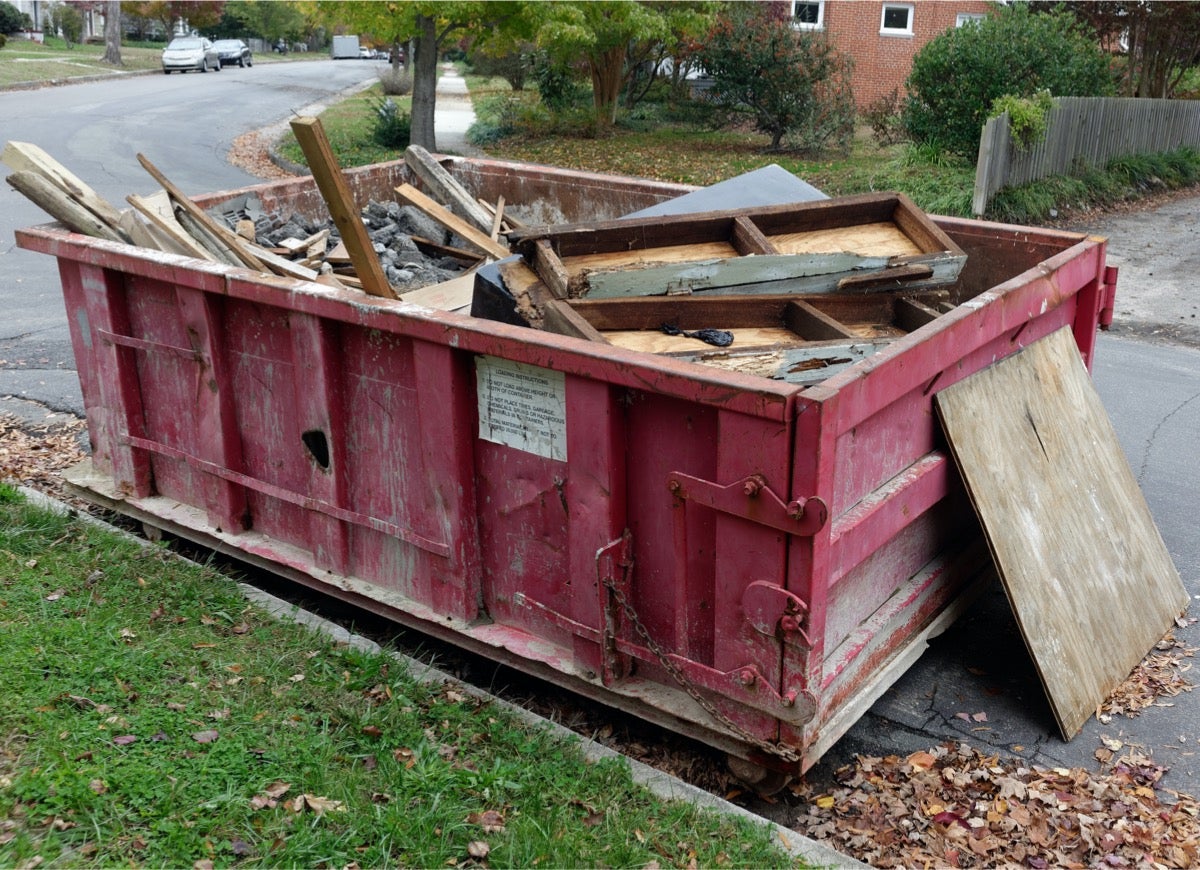
Get the number for a good waste management service—you’re going to need them several times throughout the renovation process. Demolition alone produces (literal) tons of garbage, so an on-site dumpster is critical for homeowners who don’t want to store piles of old fixtures, floorboards, and windows in their yard. Then, once the actual renovation begins, it’s helpful to have that dumpster handy to collect construction material packaging and offcuts.
Anything That Can Go Wrong, Might

While DIY renovators always hope their project will be smooth sailing, be aware that there may be a few hiccups, delays, and unintentional damage along the way.
For instance, there may have been a slight gap in the basement foundation that the home inspector missed, and then when the winter snow started to melt, several gallons of water seeped in under your newly laid basement flooring, which you then had to pull up, dry off, and reinstall. Or, the plumber you hired used the wrong pipe for your town’s building code and has to redo a week’s worth of work. (True stories—both happened to me!)
These setbacks are frustrating and disheartening, but know that they happen on every project and that things will keep moving forward, even if it takes a bit longer.
Be Prepared for a Lot of Phone Calls and Coordination

Architects. Roofers. Siders. Framers. Plumbers. Electricians. HVAC specialists. Drywall installers. Tilers. Kitchen designers. Deck builders. Building inspectors. These are just a few of the people homeowners will need to be in contact with during a full-home renovation, even if they’re doing certain projects themselves.
Also, even if you’re planning to complete most of the work during your evenings and weekends, you’ll need to take some time away from your day job to coordinate with your municipality’s permit office, building inspectors, and any contractors you’re hiring for the renovation.
A Full Renovation is Completely Worth it to Have the Home of Your Dreams

Homeowners who gut and renovate their house are in for a wild, unpredictable, and often expensive journey filled with blood, sweat, and tears. But how many people get to say they built the home of their dreams?
When it’s all done, you’ll have a beautiful new space to enjoy, with the added pride of knowing you made this happen with your own two hands.
Related: 9 Reasons Why DIY is Good for Your Well-Being, According to Science
